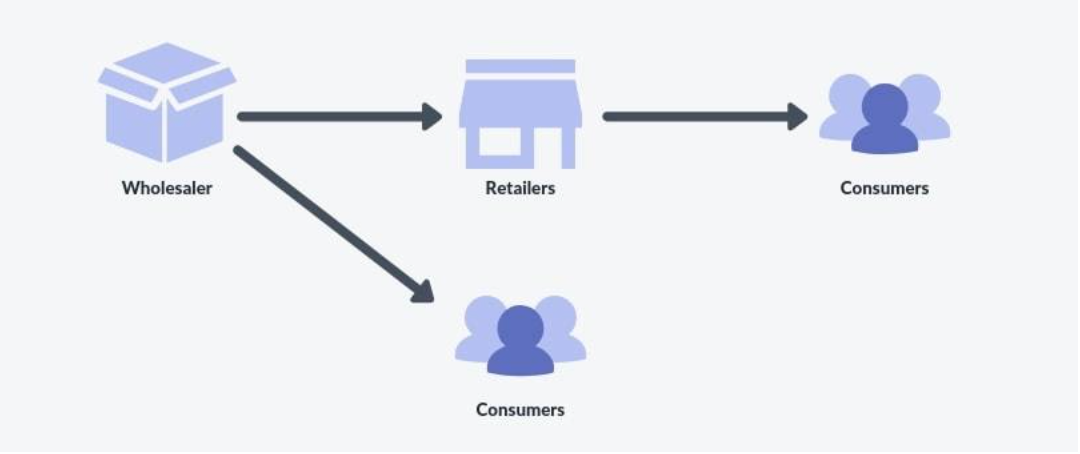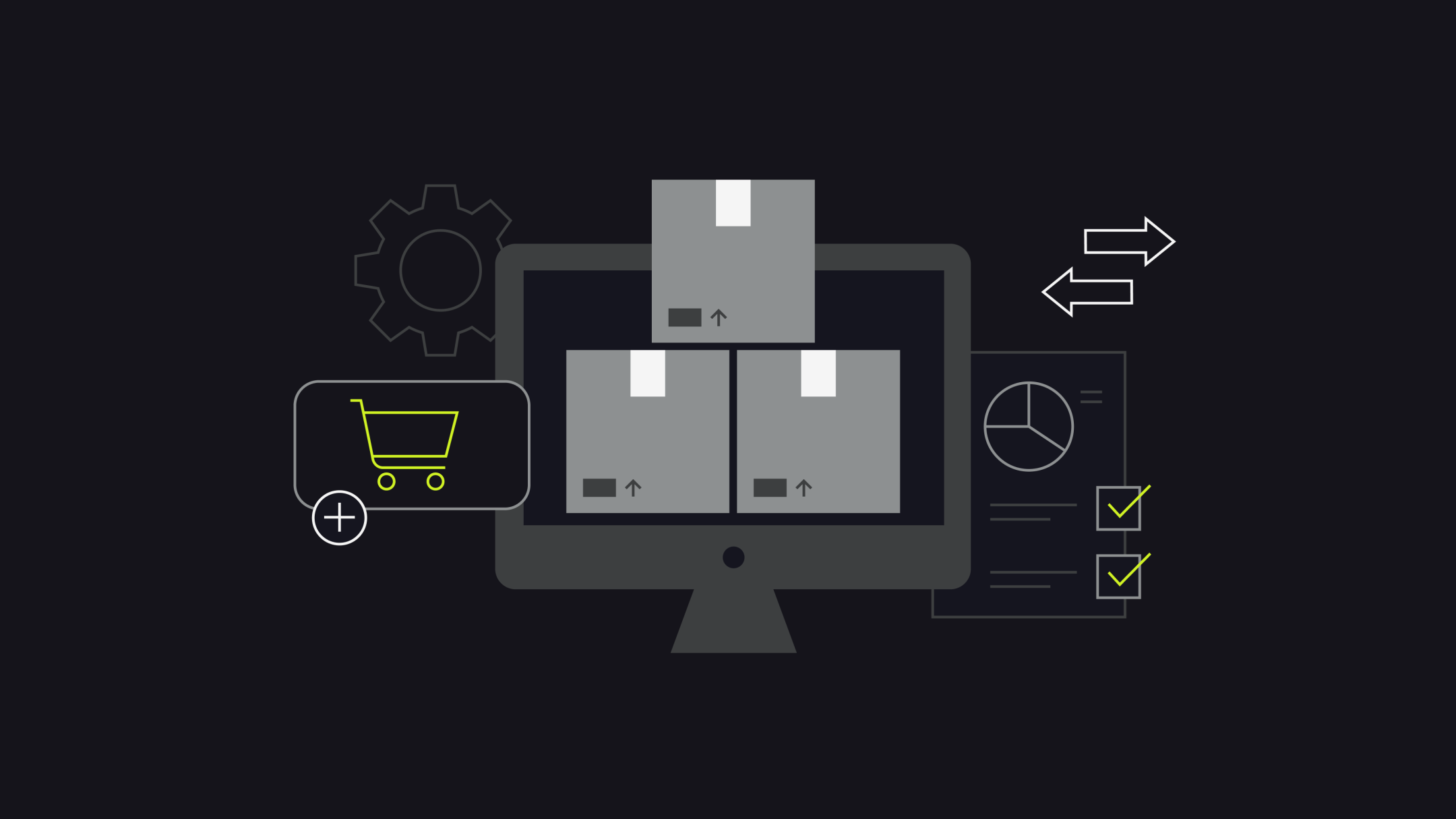Wholesale ecommerce refers to selling products to another business, in bulk and at a discount, online. This wholesale ecommerce industry is huge, totaling $9.2 trillion in 2023 alone.
The benefits are clear: higher order volume, less time spent on manual entry and admin tasks. Becoming a wholesaler helps you expand into this huge market and find new revenue streams for your business.
So, how can you take advantage of the action? This guide will walk you through how wholesale ecommerce works, how to find a wholesale ecommerce platform, and tips for creating your online wholesale store.
Table of Contents
- How wholesale ecommerce works
- B2B wholesale versus retail ecommerce
- Types of wholesalers
- How B2B ecommerce helps wholesalers
- How to choose a wholesale ecommerce platform
- Wholesale ecommerce FAQ
How wholesale ecommerce works
The most common type of wholesale is between producers (you) and retailers. However, there are wholesalers who sell to other wholesalers, and wholesalers—like Costco, for example—who sell directly to consumers.

The most significant advantage of selling wholesale is that it lowers the cost of doing business. By selling items in bulk, you get to take advantage of larger orders and less marketing spend, which generally leads to making more money per unit. It also adds another channel to your sales mix.
The first thought that comes to mind about wholesale ecommerce is mega-sites like Alibaba. Wholesale is often thought of as a traditional sales channel with a less than ideal buying experience. But technology and changing B2B buyer behavior has driven a change in wholesale ecommerce.
Today, retail ecommerce businesses are selling wholesale to drive growth, without enormous capital investment or high risk. With the right B2B ecommerce platform, merchants considering going into wholesale on a large or small scale can automate the process from signup to checkout, offer wholesale-specific pricing, and more.
B2B wholesale versus retail ecommerce
Now that you know how a wholesale ecommerce website works, let’s look at the main differences between it and retail ecommerce. The key distinctions are:
- Target audience
- Order volume
- Pricing
- Relationship management
Target audience
Wholesale businesses sell their products to other businesses (B2B), which could include manufacturers, distributors, retailers, or other wholesalers. These clients usually purchase items in large quantities for the purpose of reselling them to the end consumers.
For example, a clothing manufacturer sells large quantities of t-shirts to a retail store chain through its ecommerce platform.
Retail businesses sell directly to the end consumer (B2C). This involves selling products in smaller quantities, and often, a wide variety of products are offered to cater to the diverse needs of individual consumers.
An online clothing store selling individual t-shirts directly to consumers through its website or app is an example of retail.
Order volume
A wholesale ecommerce business deals in bulk orders. They are often willing to offer large quantities of goods at a discounted rate, based on the principle that the more you buy, the less the cost per unit. For example, a restaurant supply wholesaler sells bulk packs of cooking utensils to restaurant businesses.
Retailers sell products in single units or in smaller quantities, as per the requirement of the individual customer. For instance, an online kitchenware store selling a single set of cooking utensils to home cooks.
Pricing
Wholesalers sell their goods at lower prices per unit, given the high volumes involved. Lower prices are feasible because the cost of selling a large volume of goods to one buyer is less than doing the same for individual units to multiple buyers. For example, a wholesaler selling a bulk of 100 LED bulbs at $5 each to a hardware store.
Retailers, selling directly to consumers, have higher prices per unit, since they need to cover the costs of storing, marketing, and selling items. One example is an online lighting store selling a single LED bulb to a customer for $10.
Relationship management
Wholesale ecommerce businesses engage in long-term relationships with clients. Since clients typically require ongoing supplies, customer retention is key. Wholesale ecommerce platforms include features that encourage healthy relationships, like customized pricing for specific clients, order history tracking, reordering functionalities, and more.
While they do value repeat business, retailers often deal with one-off or occasional purchases from customers. Retail ecommerce platforms often focus more on features like personalized product recommendations, customer reviews, and easy return processes.
“Don’t fall into the trap of thinking that B2B is fundamentally different from B2C ecommerce,” says Bryan Eisenberg, co-author of Be Like Amazon: Even a Lemonade Stand Can Do It. “There are nuances depending on your customer’s level of technical proficiency. But at the end of the day, we are still selling to people.
“Ecommerce expectations are being set by others outside your industry, like Amazon.com. Leverage video, plenty of pictures, reviews, and live chat if possible.”
Types of wholesalers
Whether you want to work with wholesalers, or become one yourself, it’s important to know the different ways this B2B business model works.
Manufacturers
This is the actual manufacturer who also acts as the wholesaler. They sell their own stuff to retailers in large quantities. If a company makes LED lights, it might sell them in bulk to retailers or to businesses that use them.
Distributors
Distributors aren’t the original manufacturers. They buy directly from manufacturers, then sell in bulk to retailers.
Distributors handle logistics and customer relationship management, so manufacturers can focus on production. A distributor wholesaler might buy beverages from a manufacturer and sell them to restaurants and grocery stores.
Dropshippers
Online wholesalers like these don’t keep inventory. Instead, they list the manufacturer’s wholesale products on their website, and when they make a sale, the manufacturer ships the product directly to the customer.
Import/export
Wholesalers like these specialize in international trade. They either import products from other countries or export domestic products. For example, an importer/exporter wholesaler might import wines from France and Italy to sell in the United States.
How B2B ecommerce helps wholesalers
It’s long thought that B2B customers shunned digital channels. It’s true. Traditional wisdom held that buying wholesale was too complex to be conducted online, which is why so many suppliers haven’t made an investment in ecommerce just yet.
The availability of information through digital channels has made it easier for B2B buyers to collect information independently. This means you have fewer opportunities to influence wholesale buyers’ decisions in person.
Technology like B2B ecommerce platforms have made it easier for wholesalers to sell online and to take advantage of the following benefits:
It simplifies the buying process
Wholesalers often feel ecommerce is not suitable for them because of the complex buying process. Concerns over contract pricing, product exclusivity, and customers with special terms and conditions discourage the adoption of ecommerce.
While these are valid concerns, the right wholesale ecommerce platform can help overcome these challenges and drive business growth. You can easily create a private B2B ecommerce website with all the information a client needs, rather than have them reach out for basic information.
"The myth that a memorable purchasing experience matters—that’s false. The online experience for wholesale ecommerce websites should be as minimal as possible. Buyers want products that perform. Buyers have POs to enter and want the least amount of hiccups possible."
—Neil Stuber, Brand Manager at Hurraw! Balm
Ecommerce has also made it easier for wholesale customers to find wholesalers and distributors online. When you optimize your website for search engineers, it helps potential buyers find you online faster.
It helps automates wholesale processes
Ecommerce automation is one of the biggest advantages of selling wholesale today. From signup to checkout, you’ll spend less time managing orders over the phone and email and more time on the strategic needs of your business.
"Without a doubt, the biggest myth about a wholesale business is that the self-service ordering model used in retail won’t work. As in retail, business customers benefit greatly from the time and effort savings of online ordering, in their own time, with full visibility of the status of their order."
—Ben Chidiac, Co-founder of Beard & Blade
Ecommerce technology today, like B2B Ecommerce by Shopify, can help you:
- Create custom pricing and percentage discounts for specific customers or groups
- Automate and review customer signups
- Let customers purchase, track, and reorder products
- Review orders before invoicing
- Streamline inventory and order management
It improves the buyer experience
B2B buyers have come to expect the same service as their B2C counterparts. Buyers today are armed with information and don’t need to speak to a representative before purchasing. They prefer simple onboarding and ordering experiences. It’s why Shopify offers features like a 24/7 customer accounts portal that customers can access without assistance.
“Don’t think that your website should cater to all audiences. When you know your audience, tailor the experience to them to maximize profits for wholesale,” says Jesse Teske, VP of performance marketing at ThinkWarwick.
“This means understanding what features your customers really care about. Do they need the bells and whistles that the average consumer needs? Do they need interactive guides and tools to help them find the products, or do they just want a clean interface, straightforward pricing, and support when they need it?"
Ecommerce can help wholesalers anticipate buyers’ needs. It can aid the buyers’ research process and guarantee they can easily access content throughout the buying process.
It increases sales while lowering spend
Selling wholesale online is the fastest way to speed up business growth. If you’re a manufacturer, selling in bulk can help raise product volume and lower cost-per-unit, which, in turn, helps your profit margin. Shipping in bulk to fewer customers can also lower fulfillment costs.
It helps enter new markets
Moving into a new country or territory comes with its own set of logistical challenges. You’ll also be marketing to a new audience that’s never heard of you.
When an established retailer teams up with your business, you can leverage its supply chain to reduce risk and lower setup costs. Wholesalers also save money on marketing by getting access to the retailer’s existing customer base.
How to choose a wholesale ecommerce platform
Here are some guidelines to follow when finding best wholesale ecommerce platforms for your brand:
Separate, password-protected wholesale websites
A separate, password-protected wholesale store is key when building your B2B ecommerce arm. Your wholesale ecommerce platform should make it easy for you to create a store. It should also be simple to add your products, create customer accounts, and create wholesale price lists.
Good search functionality and catalog browsing
Site search is often the most overlooked function of a wholesale ecommerce site. Effective search functionality means better usability, which helps buyers find items faster. The easier buyers can find products, the more likely they are to place an order.
Take The Elephant Pants wholesale portal, for example. The brand includes a number of B2B ecommerce elements, such as accessible search bar, an extensive catalog for browsing, and clear pricing.
According to Elephant Pants CFO and founder James Brooks, between 80% and 90% of buyers create their order through the wholesale channel. Terms are determined on a buyer-to-buyer basis, which has resulted in wholesale as a key sales channel for the brand.
Integrations and flexible APIs
Integrations are the secret to a successful wholesale ecommerce store. Setting up an easy-to-use sales portal is the cost of entry, but integrations will take you to the top.
A good wholesale ecommerce platform will let you:
- Create custom storefronts and experiences
- Integrate with existing systems like an ERP or CRM through a flexible API and SDK
- Connect your online business tools with ecommerce automation
- Automate everything from simple tasks to complex workflows
Choose a platform that has a reliable API and developer tool releases. Look for a platform that gives you unlimited development environments so you can test store changes before sending them live.
Optimized for search and content marketing
B2B buyers are no different from B2C buyers when it comes to finding solutions. Both groups search through Google to find the right supplier that meets their needs. The difference is that B2B buyers won’t land on a product page and check out with their credit card straight away. They have to sort through logistics, have a few board meetings, and consider storage facilities before committing to a supplier.
This is why it’s important to find an ecommerce platform that’s optimized for search.
"SEO is a goldmine for B2B, and in many niches, it’s significantly less competitive than B2C. Many of the top brands haven’t invested a dollar in SEO because they haven’t had to. For example, I recently helped a B2B chocolate company hit number four for their top keyphrase, overtaking heavyweights like Lindt and Godiva … in a single month."
—Jacob McMillen, SEO and Content Strategist
Some search-friendly elements to look for are:
- Apps and plug-ins to help with SEO
- Optimized product and collection pages
- Content marketing capabilities like blog hosting and FAQ pages
"A lot of B2B and wholesale ecommerce websites get caught up in being data-driven to succeed. You should be data-informed, but today’s shoppers find your product in so many different ways from so many different channels that you can succeed quite well by top-of-funnel and brand awareness alone."
—Kevan Lee, Director of Marketing at Buffer
Support omnichannel inventory management
Omnichannel inventory management is an important aspect to consider when choosing a B2B platform. If you have (or plan to have) multiple sales channels, you’ll need a platform that integrates with all your sales channels, like a physical store, online store, and third-party marketplaces.
A good B2B commerce platform ensures real-time syncing of inventory levels across all your sales channels. So when a product is sold in one channel, the inventory is updated across all channels. This prevents overselling and understocking, which can both harm your reputation and lead to lost sales.
Putting wholesale ecommerce together
If you’re going to sell wholesale today, you need an online platform that provides an excellent user experience and delights potential customers.
B2B Ecommerce by Shopify offers first-party B2B features that are built directly into the admin. Choose between a blended B2B and DTC store, or a dedicated B2B-only store, and set price lists, payment methods, currency, and more for each B2B customer you sell to. You can also utilize Shopify’s most customizable features to enhance your store, including themes, discounts, API access, and more.
Wholesale ecommerce FAQ
What is wholesale ecommerce?
Wholesale ecommerce is a B2B ecommerce model where you sell products in bulk and at a discount to other businesses rather than to consumers individually.
Which platform is best for wholesale?
Shopify Plus is the best platform for B2B ecommerce. Create an incredible experience for both DTC and B2B customers while leveraging the global scale of Shopify’s ecommerce platform.
What is wholesale versus B2B?
Wholesale refers to the process of selling goods in large quantities at a low price, typically to retailers. B2B is a broader term that represents transactions between businesses, such as between a manufacturer and a wholesaler, or between a wholesaler and a retailer, which can involve services, technology, or products.
What features should I be looking for in a B2B ecommerce solution?
- Customer-specific pricing and price lists
- Search/navigation
- Product catalog
- Protected login
- Customer account view
- Branding and design options
- Easy, intuitive admin and customer experience
Read More
- International Ecommerce Strategy: New Tools to Simplify Global Growth for High-Volume Businesses
- Why Are You Still Paying Over $1 Million for an Ecommerce Site? The Answer May Shock You
- 10 Best Omni-Channel Retailers and What You Can Learn From Them
- Resources to Help Merchants Get Online Fast, Optimize Stores, and Scale
- Hypefest 2018: O2O Examples from the Forefront of Marketing & Retail
- Rethinking Retargeting: Finding the Line Between Stalking and Solving
- How 3 Brands Scaled Their Ecommerce Subscription Model 100-350%
- Multi-Channel Customer Acquisition: 7 Tips from $3.7M+ in Ad Spend
- The Dark Side of Entrepreneurship with Data & Resources for Help
- Harnessing the Power of Feedback Loops to Build a Business Customers Can't Resist






